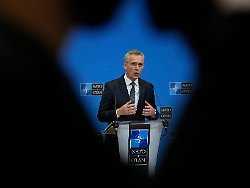“Hurted by Moscow”
Stoltenberg doubts the NATO-Russia pact
02/25/2022, 9:18 p.m
The Russian invasion of Ukraine shakes NATO to its foundations. To what extent, Secretary General Stoltenberg indicates: the commitment not to station any combat troops in Eastern Europe only applies if Moscow also keeps to its obligations.
NATO Secretary General Jens Stoltenberg has been evasive when asked whether the military alliance considers the NATO-Russia Founding Act to be obsolete following the Russian invasion of Ukraine. After a crisis summit of the heads of state and government of the 30 NATO countries, the Norwegian said in the evening: “This is the reality: the NATO-Russia Founding Act does not work because one side, Russia, has violated it for many years.”
The NATO-Russia Founding Act was signed by both sides in 1997 and regulates mutual relations, cooperation and security between the NATO countries and Russia. Through them, NATO has committed itself, among other things, to refraining from permanently stationing “substantial combat troops” in the eastern alliance area. The NATO countries also confirm that they have no intention of stationing nuclear weapons with new Allies.
With regard to Russia’s attack on Ukraine, Stoltenberg now pointed out that the territorial integrity and sovereignty of all countries is the basis of the Founding Act. If you have a Founding Act between two partners and one side doesn’t respect the agreement, the agreement doesn’t work, he said. “It doesn’t help us improve our relationship with Russia.” The closing statement of the video conference said that Russia was “the one who has withdrawn from its obligations under this file”.
Rapid Reaction Force for Deterrence
Stoltenberg had previously announced that he would be relocating units of the NATO Rapid Reaction Force (NRF) to deter Russia. At first he did not say where the units would be sent to. He only spoke of several thousand soldiers who should be deployed on land, at sea and in the air. They were to be deployed at various locations in the Eastern Alliance area. Defense Minister Christine Lambrecht later stated that a company of the Bundeswehr would be transferred to Slovakia.
According to dpa information, ground troops could be sent to Romania, southwest of Ukraine. In any case, it is planned to send NRF units to an exercise in the NATO country Norway, which borders Russia. The NRF, which has around 40,000 soldiers, includes the VJTF, also known as “Spearhead”, which is currently led by France. According to information from the previous week, Germany is currently providing around 750 forces for the alliance’s fastest reaction force.
A total of around 13,700 German soldiers are available this year for NATO’s rapid deployment forces. It is the first time that parts of the NRF have been relocated as part of the deterrence and defense of Alliance territory, Stoltenberg said. The heads of state and government of the 30 member states stressed in a statement that the measures were “preventive, proportionate and non-escalating.”
